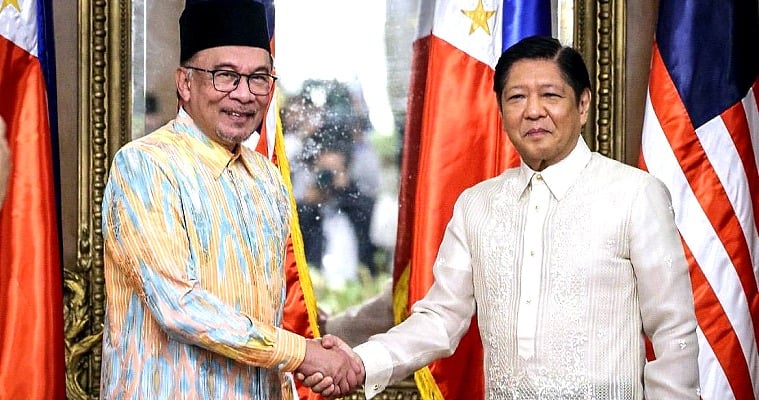As Malaysian Prime Minister Datuk Seri Anwar Ibrahim energetically approaches Malaysia’s foreign policy, a far departure from previous administrations, new opportunities to forge strong alliances with fellow Association of South-East Asian Nations (Asean) members have emerged.
Of note is the recent trip by Anwar to the Philippines where he no doubt discussed a range of bilateral security challenges with the country’s President Ferdinand R. Marcos Jr including the Sulu claim and Moro Islamic Liberation Front (MILF).
As important as these certainly are both Malaysia and the Philippines face a more ominous threat to their national sovereignty and territorial integrity as China aggressively moves to solidify its claims over the South China Sea (SCS) through patrols, the building of militarized islands and even harassment with the use of lasers and other tactics.
Both face the same threat, and both have the same vulnerability in traditional and non traditional challenges. Manila at least has greater US assurances of support and therefore has greater deterrence capacity with clearer military support to deter greater Beijing.
The Philippines has more structured deterrence credibility, especially now with the revival of Subic Bay’s potential presence of US forces.
Malaysia, however, has no direct military assurances, and only relies on diplomatic goodwill and existing conflict prevention tools.
This presents an opportunity for Malaysia: Manila clearly seeks a more expanded deterrence than only relying on the West and will want a stronger Malaysia as a security partner to help it shape its diplomatic defense strategy against China’s designs in the region.
The Philippines will also want to form a quadruple formation with Vietnam, Malaysia and Indonesia to strengthen joint interoperability and defense cooperation, where all face the same challenges over the SCS, giving Malaysia a unique opportunity to play a leading role in regional security.

Internationally Malaysia is seen as the weakest link in the region in standing up over the SCS, at least in direct hard messages and readiness to stand up against Beijing’s agenda.
Therefore, Manila’s venture will also provide greater openings for Malaysia, and it will want to tap into Malaysia’s regional leadership and credentials in economic supply chain resilience and resources to shore up its internal economic structure and disparity.
Anwar has strongly indicated Malaysia’s stance against fighting aggression and bellicosity with the same hard power aggression, therefore downplaying the prospects of Malaysia in welcoming any form of increased military presence that could escalate tensions.
This is a clear message in reiterating Putrajaya’s decades old stance of treating the region as one that is free from external influence and through the conventional conflict prevention mechanisms.
However the extent of Malaysia’s success in relying on the low profile and behind the scenes engagement with Beijing over the sensitive dispute and the series of incursions has been very much debatable, although many suggest it has yielded little to no impact, even backfiring in many ways.
Considering the ability of both Malaysia and the Philippines to field a credible military deterrent, both can now leverage on the defensive and economic might of the US as it seeks to shore up Taiwan’s security.
Bolstered by US support both countries can at least put up a credible deterrent and dissuade further acts of sovereignty violations.
While some may argue that such moves might risk antagonizing China and putstrade ties and investment at risk, remaining weak will certainly invite ever more aggressive moves against Malaysia SCS claims especially in its exclusive economic zone (EEZ).
This is not a theory but a fact as China continuously probes the area for weaknesses.
Putting up a strong front will show China that while Malaysia considers it a valuable trading partner, it will not compromise its national interests.
The visits to the Philippines and a string of regional neighbor preceding that reflect the immediate regional priority for the new Malaysian leadership but this must be backed up by a real and solid commitment towards Asean and Malaysian security.
(Collins Chong Yew Keat is with Universiti Malaya, focuses on internationalization and strategic management.)
ADVERTISEMENT
ADVERTISEMENT








































